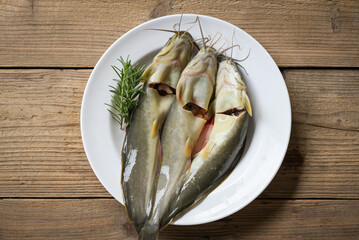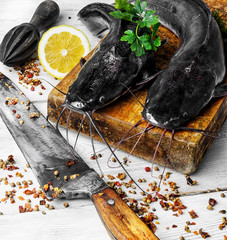
Catfish is a type of freshwater fish that is widely consumed as food around the world. It is known for its mild flavor and versatility in cooking, making it a popular choice for many people. However, for those who follow Islamic dietary laws, the question of whether catfish is halal (permissible) or haram (forbidden) is an important consideration.
The determination of whether a food is halal or haram is based on Islamic teachings and is an integral part of the Muslim faith. In this article, we will explore the debate over the halal status of catfish and examine the factors that may affect its halal status according to Islamic teachings.
Whether you are a Muslim looking to follow halal dietary practices or are simply interested in learning more about the topic, this article will provide a thorough overview of the issue.
Is Catfish Halal Or Haram?
Table of Contents
Catfish is halal. However, the question of whether catfish is halal or haram (forbidden) in the context of Islamic dietary laws is always a matter of debate among scholars.

Some argue that catfish should be considered haram due to its physical characteristics, such as its barbels (fleshy tentacles used to locate food) which they believe make it more similar to animals that are considered haram, such as pigs.
However, others argue that catfish should be considered halal due to the general permissibility of fish in Islam and the fact that its physical characteristics do not make it significantly different from other types of fish.
Ultimately, the determination of whether to consume catfish or any other food item is a personal decision that should be based on individual beliefs and practices. Some Muslims may choose to avoid catfish due to the debate over its halal status, while others may choose to consume it based on their own interpretation of Islamic teachings and personal beliefs.
It is important to note that the way in which catfish is caught, processed, and prepared may also affect its halal status. Factors such as the presence of any prohibited substances or the use of prohibited methods of slaughter may also play a role in determining the halal status of catfish.
Factors That May Affect the Halal Status of Catfish
There are several factors that may affect the halal status of catfish according to Islamic teachings. One of these factors is the way in which the catfish is caught, processed, and prepared. For example, if the catfish is caught using prohibited methods or if any prohibited substances are used in its processing or preparation, it may be considered haram.
Another factor that may affect the halal status of catfish is the role of individual interpretation and personal belief. While some scholars may argue that catfish is haram due to its physical characteristics, others may disagree and believe that it is halal due to the general permissibility of fish in Islam.
The determination of whether to consume catfish or any other food item is a personal decision that should be based on individual beliefs and practices. It is important for Muslims to carefully consider their own beliefs and practices when deciding whether to consume catfish or any other food item.
What Religion Can’t Eat Catfish?
There is no specific religion that prohibits the consumption of catfish. The question of whether catfish is halal (permissible) or haram (forbidden) in the context of Islamic dietary laws is a matter of debate among scholars, with some arguing that it should be considered haram due to its physical characteristics and others arguing that it should be considered halal due to the general permissibility of fish in Islam. However, this debate does not necessarily apply to followers of other religions.
It is worth noting that certain dietary restrictions may be followed by individuals within any religion, but these restrictions are generally not considered to be core beliefs or practices within the religion as a whole. For example, some Hindus may choose to follow a vegetarian diet, but this is not a requirement of Hinduism and many Hindus do consume meat. Similarly, some Jews follow kosher dietary laws, but these laws do not prohibit the consumption of catfish or any other specific food item.
Which Fish Is Haram for Muslims?
According to Islamic teachings, all types of fish are generally considered to be halal (permissible) for Muslims to consume. In the Quran, it is stated that Muslims are permitted to eat “what is caught for you in the sea and food from it, a provision for you and for travelers” (Quran 5:96). This verse is often interpreted to mean that all types of fish are permissible for Muslims to eat.
There is no specific type of fish that is considered haram (forbidden) for Muslims to consume. However, there are certain conditions that must be met in order for a food to be considered halal according to Islamic teachings. These conditions include the way in which the animal is slaughtered, the presence of any prohibited substances, and the way in which the food is processed and prepared.
It is worth noting that some Muslims may choose to follow stricter dietary guidelines beyond those outlined in Islamic teachings, such as avoiding certain types of fish due to environmental concerns or personal beliefs. However, these stricter guidelines are not considered to be part of traditional Islamic teachings and are a matter of personal choice for individual Muslims.
Is It Safe to Eat Catfish?
Catfish are generally considered to be safe to eat when it is properly handled and cooked. Like any other type of seafood, catfish can contain bacteria or parasites that can cause illness if the fish is not handled and cooked properly. However, these risks can be minimized by following proper food safety guidelines.
Here are some tips for ensuring that catfish is safe to eat:
- Purchase catfish from a reputable source: Choose a fishmonger or market that has a good reputation for selling fresh, high-quality seafood.
- Store catfish properly: Keep catfish refrigerated at 40°F (4°C) or below until you are ready to cook it. If you are not going to cook the catfish within a day or two, it is best to freeze it to extend its shelf life.
- Cook catfish thoroughly: Cook catfish to an internal temperature of 145°F (63°C) to ensure that it is safe to eat.
- Follow proper food safety practices: Wash your hands, utensils, and surfaces with hot, soapy water before and after handling raw catfish. Avoid cross-contamination by keeping raw and cooked catfish separate.
By following these guidelines, you can help ensure that catfish is safe to eat and enjoy it as part of a healthy and balanced diet.
Conclusion
In conclusion, catfish is a popular and versatile type of fish that is enjoyed by people around the world. In the context of Islamic dietary laws, the question of whether catfish is halal (permissible) or haram (forbidden) has been the subject of some debate among scholars.
While some argue that catfish should be considered haram due to its physical characteristics, others argue that it should be considered halal due to the general permissibility of fish in Islam. However, most people agree that catfish is halal.
It is important to follow proper food safety guidelines and to carefully consider one’s own beliefs and practices when deciding whether to consume catfish or any other food item.

Hi, I’m Iolanda I am a mother of two and know how to whip up satisfying dishes for friends and family in a seemingly effortless way. The blog goal is reader-oriented, So We are always looking for the newest information about the best products on the market to offer product reviews and tutorials to assist users.Have Fun on The Website






